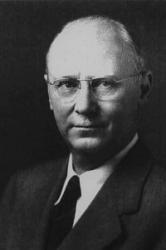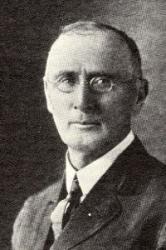Planning worship?
Check out our sister site, ZeteoSearch.org,
for 20+ additional resources related to your search.
- |
User Links
Person Results
Thoro Harris

1874 - 1955 Composer of "[When I shall wake on that fair morn of morns]" in Echoes of Paradise Born: March 31, 1874, Washington, DC.
Died: March 27, 1955, Eureka Springs, Arkansas.
Buried: International Order of Odd Fellows Cemetery, Eureka Springs, Arkansas.
After attending college in Battle Creek, Michigan, Harris produced his first hymnal in Boston, Massachusetts, in 1902. He then moved to Chicago, Illinois at the invitation of Peter Bilhorn, and in 1932, to Eureka Springs, Arkansas. He composed and compiled a number of works, and was well known locally as he walked around with a canvas bag full of handbooks for sale. His works include:
Light and Life Songs, with William Olmstead & William Kirkpatrick (Chicago, Illinois: S. K. J. Chesbro, 1904)
Little Branches, with George J. Meyer & Howard E. Smith (Chicago, Illinois: Meyer & Brother, 1906)
Best Temperance Songs (Chicago, Illinois: The Glad Tidings Publishing Company, 1913) (music editor)
Hymns of Hope (Chicago, Illinois: Thoro Harris, undated, circa 1922)
--www.hymntime.com/tch
Thoro Harris
Thomas C. Neal
1849 - 1916 Person Name: T. C. Neal Composer of "[When I shall wake in that fair morn of morns]" in The Cyber Hymnal
Thomas C. Neal
George C. Stebbins

1846 - 1945 Person Name: Geo. C. Stebbins Composer of "[When I shall wake in that fair morn of morns]" in Church Hymns and Gospel Songs Stebbins studied music in Buffalo and Rochester, New York, then became a singing teacher. Around 1869, he moved to Chicago, Illinois, to join the Lyon and Healy Music Company. He also became the music director at the First Baptist Church in Chicago. It was in Chicago that he met the leaders in the Gospel music field, such as George Root, Philip Bliss, & Ira Sankey.
At age 28, Stebbins moved to Boston, Massachusetts, where he became music director at the Claredon Street Baptist Church; the pastor there was Adoniram Gordon. Two years later, Stebbins became music director at Tremont Temple in Boston. Shortly thereafter, he became involved in evangelism campaigns with Moody and others. Around 1900, Stebbins spent a year as an evangelist in India, Egypt, Italy, Palestine, France and England.
(www.hymntime.com/tch)
George C. Stebbins
E. L. Jorgenson

1886 - 1968 Composer of "[When I shall wake in that fair morn of morns]" in Great Songs of the Church Born: December 9, 1886, Nebraska.
Died: December 14, 1968, at his home in Louisville, Kentucky.
Buried: Cave Hill Cemetery, Louisville, Kentucky.
Jorgenson was the son of Danish immigrants. His father, Christopher Jorgenson, had been a soldier in the personal guard of the king of Denmark (probably Christian IX), and his mother a seamstress to the queen. The 1900 census shows the family living in Boone County, Nebraska. As a young man, Elmer led singing in churches in and around Albion, Nebraska, and in nearby Missouri. He was directing the music department at Western Bible and Literary College by 1908. In 1910, he and his wife Irene moved to Louisville, Kentucky. He was a member of the Churches of Christ.
Jorgenson’s works include:
Truth and Grace, with Robert Boll & James Shepherd (F. L. Rowe, 1917)
Great Songs of the Church (Louisville, Kentucky: Word and Work, 1921)
The New Alphabetical Hymnal (Chicago, Illinois: Great Songs Press, 1957)
--www.hymntime.com/tch/
E. L. Jorgenson
Charles B. Widmeyer
1884 - 1974 Person Name: C. B. Widmeyer Composer of "[When I shall wake in that fair morn of morns]" in New Sacred Quartettes for Male, Female and Mixed Voices Widmeyer, Charles B. (Berkeley Springs, West Virginia, 1884--California, December 14, 1974). Studied vocal music from age 12 under J.M. Cowgill; at age 15 began teaching classes of his own. First song was written at age 15. The first one published, "Upon the Cross," was written at age 20.
Bachelor of Music degree from Bethany-Peniel, Bethany, Oklahoma. Wrote more than 350 songs; edited or contributed to many songbooks. "Come and Dine" was written following the reading of John 21:12 and his meditation on the similarity between the tired, hungry disciples and people of his day both spiritually and physically hungry; translated into Spanish, Japanese, Chinese, Arabic, and Serbian.
--E. Roger Taylor, DNAH Archives
Charles B. Widmeyer
P. P. Bilhorn

1865 - 1936 Composer of "[When I shall wake in that fair morn of morns]" in Hymns of the Second Coming of Our Lord Jesus Christ Pseudonyms: W. Ferris Britcher, Irene Durfee; C. Ferris Holden, P. H. Roblin (a anagram of his name)
================
Peter Philip Bilhorn was born, in Mendota, IL. His father died in the Civil War 3 months before he was born. His early life was not easy. At age 8, he had to leave school to help support the family. At age 15, living in Chicago, he had a great singing voice and sang in German beer gardens there. At this time, he and his brother also formed the Eureka Wagon & Carriage Works in Chicago, IL. At 18 Peter became involved in gospel music, studying under George F. Root and George C. Stebbins. He traveled to the Dakotas and spent some time sharing the gospel with cowboys there. He traveled extensively with D. L. Moody, and was Billy Sunday's song leader on evangelistic endeavors. His evangelistic work took him into all the states of the Union, Great Britain, and other foreign countries. In London he conducted a 4000 voice choir in the Crystal Palace, and Queen Victoria invited him to sing in Buckinghm Palace. He wrote some 2000 gospel songs in his lifetime. He also invented a folding portable telescoping pump organ, weighing 16 lbs. It could be set up in about a minute. He used it at revivals in the late 19th century. He founded the Bilhorn Folding Organ Company in Chicago. IL, and his organ was so popular it was sold all over the world. He edited 10 hymnals and published 11 gospel songbooks. He died in Los Angeles, CA, in 1936.
John Perry
P. P. Bilhorn
H. N. Lincoln

1859 - 1948 Composer of "[When I shall wake in that fair morn of morns]" in The New Evangel Horace Neely Lincoln, 1859-1948. Horace was the son of James Lincoln and Emaline King, and husband of Etta Lee Thurmand (married 1887).
He moved with his family to Texas when he was seven years old. At age 10, he began attending a singing school conducted by James M. Jolley of Mississippi. In 1880, he taught his first singing class in his old neighborhood school house. Later that year, he attended his first normal music school, taught at Mountain Home (now Holland), Texas.
Lincoln had other musical training under L. B. Shook (a former student of Philip Bliss) and John McPherson of Illinois. In 1898, he graduated from the Chicago National College of Music, and in 1906 took a post-graduate course under Horatio Palmer.
Lincoln eventually became president of the Songland Music Company, and the World’s Normal Musical College.
© The Cyber Hymnal™ (hymntime/tch)
H. N. Lincoln
D. B. Towner

1850 - 1919 Arranger of "[When I shall wake in that fair morn of morns]" in Hymns New and Old, No. 2 Used pseudonyms Robert Beverly, T. R. Bowden
==============================
Towner, Daniel B. (Rome, Pennsylvania, 1850--1919). Attended grade school in Rome, Penn. when P.P. Bliss was teacher. Later majored in music, joined D.L. Moody, and in 1893 became head of the music department at Moody Bible Institute. Author of more than 2,000 songs.
--Paul Milburn, DNAH Archives
D. B. Towner
George W. Crofts
1842 - 1909 Person Name: Rev. G. W. Crofts Arranger of "I Shall Be Satisfied" in Towner's Male Choir Nos. 1, 2, 3, 4 Combined We have little data on Crofts, except that he was a minister.
--www.hymntime.com/tch/
George W. Crofts
F. E. Belden

1858 - 1945 Composer of "[When I shall awake in that fair morn of morns]" in Songs for the King's Business Belden was born in Battle Creek, Michigan in 1858. He began writing music in his late teenage years after moving to California with his family. For health reasons he later moved to Colorado. He returned to Battle Creek with his wife in the early 1880s, and there he became involved in Adventist Church publishing. F. E. Belden wrote many hymn tunes, gospel songs, and related texts in the early years of the Seventh-day Adventist Church. Belden was able to rapidly write both music and poetry together which enabled him to write a song to fit a sermon while it was still being delivered. He also wrote songs for evangelist Billy Sunday. Though Belden’s later years were marred by misunderstandings with the church leadership over his royalties, he did donate his papers and manuscripts to the church’s seminary at his death. He died on December 2, 1945 in Battle Creek, Michigan.
N.N., Hymnary. Source: http://www.hymntime.com/tch/bio/b/e/l/belden_fe.htm
F. E. Belden


 My Starred Hymns
My Starred Hymns


